 | |
| Owner | StudyMode |
|---|---|
| URL | www |
| Registration | Optional |
Cram.com (formerly known as Flashcard Exchange) is a web-based application for creating, studying, and sharing flashcards. [1] Users on Cram.com have created over 68 million flashcards.
 | |
| Owner | StudyMode |
|---|---|
| URL | www |
| Registration | Optional |
Cram.com (formerly known as Flashcard Exchange) is a web-based application for creating, studying, and sharing flashcards. [1] Users on Cram.com have created over 68 million flashcards.
Cram.com was launched by StudyMode after it acquired FlashcardExchange.com and FlashcardDB.com. [2]
FlashcardExchange.com was originally launched in January 2001 by Culley Harrelson. [3] FlashcardExchange.com was praised by Education World as being "simply designed and intuitive to use". [4]
Users can create free accounts on the website to create their own flashcards. On FlashcardExchange.com, users had to pay to print and download flashcards, but all functionality on Cram is free. [2]
Flashcards can be created in a number of languages, such as English, French, Spanish, German, Chinese, Polish, and Portuguese. [4] Flashcards are placed into categories, including careers, language, computers, and others. [4]

Spaced repetition is an evidence-based learning technique that is usually performed with flashcards. Newly introduced and more difficult flashcards are shown more frequently, while older and less difficult flashcards are shown less frequently in order to exploit the psychological spacing effect. The use of spaced repetition has been proven to increase the rate of learning.

Advanced Placement (AP) is a program in the United States and Canada created by the College Board. AP offers undergraduate university-level curricula and examinations to high school students. Colleges and universities in the US and elsewhere may grant placement and course credit to students who obtain qualifying scores on the examinations.

MediaWiki is a free and open-source wiki software originally developed by Magnus Manske for use on Wikipedia on January 25, 2002, and further improved by Lee Daniel Crocker, after which it has been coordinated by the Wikimedia Foundation. It powers several wiki hosting websites across the Internet, as well as most websites hosted by the Wikimedia Foundation including Wikipedia, Wiktionary, Wikimedia Commons, Wikiquote, Meta-Wiki and Wikidata, which define a large part of the set requirements for the software. MediaWiki is written in the PHP programming language and stores all text content into a database. The software is optimized to efficiently handle large projects, which can have terabytes of content and hundreds of thousands of views per second. Because Wikipedia is one of the world's largest and most visited websites, achieving scalability through multiple layers of caching and database replication has been a major concern for developers. Another major aspect of MediaWiki is its internationalization; its interface is available in more than 400 languages. The software has more than 1,000 configuration settings and more than 1,800 extensions available for enabling various features to be added or changed. Besides its usage on Wikimedia sites, MediaWiki has been used as a knowledge management and content management system on websites such as Fandom, wikiHow and major internal installations like Intellipedia and Diplopedia.

Open educational resources (OER) are teaching, learning, and research materials intentionally created and licensed to be free for the end user to own, share, and in most cases, modify. The term "OER" describes publicly accessible materials and resources for any user to use, re-mix, improve, and redistribute under some licenses. These are designed to reduce accessibility barriers by implementing best practices in teaching and to be adapted for local unique contexts.
Anki is a free and open-source flashcard program. It uses techniques from cognitive science such as active recall testing and spaced repetition to aid the user in memorization. The name comes from the Japanese word for "memorization".
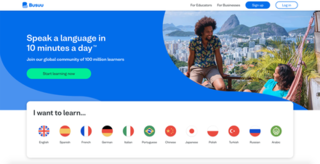
Busuu is a language learning platform on web, iOS and Android that allows users to interact with native speakers. In 2021, Chegg acquired Busuu for $436 million.

Stack Overflow is a question-and-answer website for computer programmers. It is the flagship site of the Stack Exchange Network. It was created in 2008 by Jeff Atwood and Joel Spolsky. It features questions and answers on certain computer programming topics. It was created to be a more open alternative to earlier question and answer websites such as Experts-Exchange. Stack Overflow was sold to Prosus, a Netherlands-based consumer internet conglomerate, on 2 June 2021 for $1.8 billion.
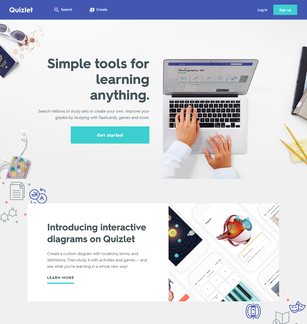
Quizlet is a multi-national American company that provides tools for studying and learning. Quizlet was founded in October 2005 by Andrew Sutherland, who at the time was a 15-year old student, and released to the public in January 2007. Quizlet's primary products include digital flash cards, matching games, practice electronic assessments, and live quizzes. In 2017, 1 in 2 high school students used Quizlet. As of December 2021, Quizlet has over 500 million user-generated flashcard sets and more than 60 million active users.
Cram is an application for Apple's OS X and iOS developed by Patrick Chukwura and Ashli Norton of SimpleLeap Software.
Khan Academy is an American non-profit educational organization created in 2006 by Sal Khan. Its goal is to create a set of online tools that help educate students. The organization produces short video lessons. Its website also includes supplementary practice exercises and materials for educators. It has produced over 10,000 video lessons teaching a wide spectrum of academic subjects, including mathematics, sciences, literature, history, and computer science. All resources are available for free to users of the website and application.
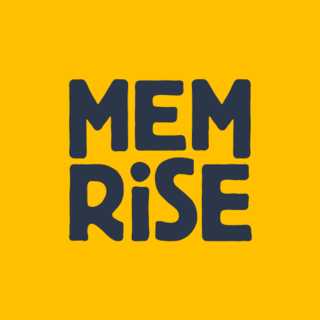
Memrise is a British language platform that uses spaced repetition of flashcards to increase the rate of learning. It is based in London, UK.

Duolingo, Inc. is an American educational technology company that produces learning apps and provides language certification. Duolingo offers courses on music, math, and 43 languages, ranging from English, French, and Spanish to less commonly studied languages such as Welsh and Irish. Other services include the Duolingo English Test, an online certification program, and Duolingo ABC, a literacy app for children. The company uses a freemium model, with its optional premium service, Super Duolingo, being ad-free and offering more features.
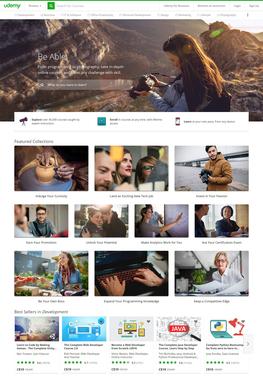
Udemy, Inc. is an education technology company, founded in May 2010 by Eren Bali, Gagan Biyani, and Oktay Caglar. It is based in San Francisco, California, United States, with hubs in Denver, Colorado; Dublin, Ireland; Austin, Texas; Melbourne, Australia; İstanbul, Turkey, and Gurgaon, India.
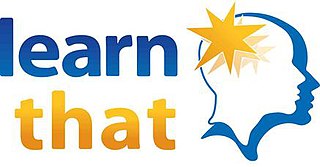
LearnThat Foundation is an American 501(c)3 nonprofit organization that develops and manages an online vocabulary and spelling program along with a free multimedia learners' dictionary, Open Dictionary of English (ODE). The foundation was founded in February 2004 under the name eSpindle Learning. In August 2010, the name was changed to LearnThat Foundation, and its domain was moved to www.LearnThat.org. The program is branded as LearnThatWord.
Student Brands is a Los Angeles County-based company that owned and operated a network of educational websites and applications.
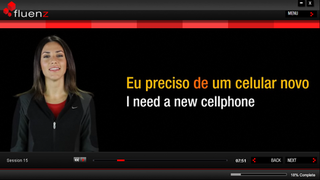
Fluenz is a digital language learning platform developed by Fluenz Inc., a U.S. entrepreneurial company. The interactive content can be downloadable or accessed online on computers and mobile devices. The product range consists of programs to learn Spanish as spoken in Latin America, Spanish as spoken in Spain, French, Italian, Mandarin, German, and Portuguese.

Cerego is a cloud-based adaptive learning technology platform that specializes in educational training technology. The platform is based on principles of neuroscience and cognitive science. Cerego's patented technology uses the scientific methods of distributed practice and the testing effect as the basis of user memory retention for content built in and available on their website.

Kahoot! is a Norwegian online game-based learning platform. It has learning games, also known as "kahoots", which are user-generated multiple-choice quizzes that can be accessed via a web browser or the Kahoot! app.
Brainscape is a web and mobile education platform that allows students to study adaptive flashcards. The website and mobile application allow students, teachers, and corporate trainers to create electronic flashcards, and to find flashcards created by other users and publishers around the world. Brainscape flashcards and marketing content are also created by expert educators and publishers with whom Brainscape closely partners to create flashcards aligned to strict instructional guidelines. Flashcards are all stored in the cloud and can be shared with groups of other learners.

Microsoft 365 is a product family of productivity software, collaboration and cloud-based services owned by Microsoft. It encompasses online services such as Outlook.com, OneDrive, Microsoft Teams, programs formerly marketed under the name Microsoft Office, enterprise products and services associated with these products such as Exchange Server, SharePoint, and Viva Engage. It also covers subscription plans encompassing these products, including those that include subscription-based licenses to desktop and mobile software, and hosted email and intranet services.